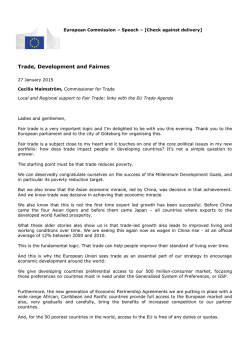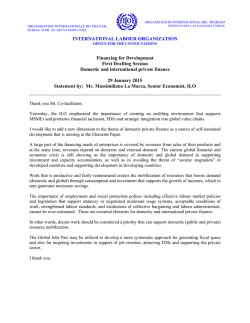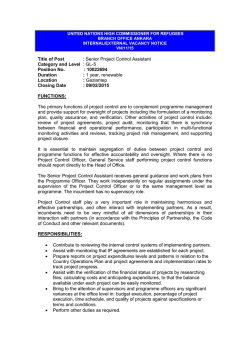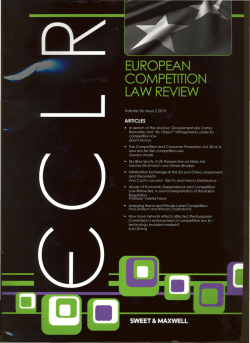
presentation - Conference of the Regulating for Decent Work Network
Making Internationalism at Work: The politics and institutionalisation of labour internationalism in terms of the influence and uses of transnational collective agreements in the UK Miguel Martinez Lucio & Stephen Mustchin Paper presented to RDW Geneva July 2015 Introduction and overview • Globalisation, MNCs and labour transnationalism • Forms of labour transnationalism - optimism and pessimism • Empirical research – four cases of transnational union activity • Internationalism – institutional and informal dimension Transnational union activity: forms and rationale • Union organisation limited by national boundaries, rise of MNCs necessitating transnational links especially with whipsawing • Levinson (1972) and three phases of co-ordination: solidarity networks, co-ordination of collective bargaining, integrated collective bargaining driven by international union bodies and MNC senior management. • Competition among workers within MNCs as a major barrier, whipsawing • Convergence of employment practices, or an increasingly diverse organisation of employment? • Examples of information sharing networks for unions within multinationals, links to social movements and NGOs (Gordon and Turner, 2000; Waterman and Simms, 2004) • International Framework Agreements (IFAs), EWCs and WWCs – some (limited) forms of international industrial relations emerging? Transnational union and labour organisations Worker organisations • European Trade Union Confederation (ETUC) – founded 1973, social partner status within EU policy process • ITUC – formed in 2006 following the merger of the International Confederation of Free Trade Unions and the World Confederation of Labour • ITSs/ Global Union Federations, e.g. IndustriALL; IUF (International Union of Food Workers); ITF (International Transport Workers’ Federation); Building and Woodworkers International (BWI); UNI (service sector) • European level trade union federations • Workers Uniting • Greater informal and direct communication between workers Transnational forums within the company and between the state • International Labour Organisation (ILO) – emergence of labour standards and a rhetoric of regulation at a global level • European Works Councils (EWCs)– in EU firms in at least 2 countries with 1000+ workers, transnational organisations for information and consultation purposes • World Works Councils (WWCs) – existed in some multinationals since 1960s, most commonly in auto manufacturing industry The debate on European Works Councils: optimism vs pessimism • Significant debate between optimists and pessimists regarding EWCs • Legal basis, (quite) widespread uptake, presence in approximately 40% of eligible MNCs, basis for development of new forms of internationalism • Formalised transnational structures, information exchange and networks of employee representatives, step towards regulating employment at transnational level However • Internal hierarchies through full time officers of the trade union and the disconnection between EWCs and trade union action • External hierarchical relations between dominant EU unions – some national unions have the resources and national influence to dominate the EWC at the expense of other national union representatives • Many EWCs dominated by management – power relations Labour transnationalism: opportunities and concerns • • • Unions are beginning to develop transnational strategies linking workers in multiple countries (e.g. Hauptmeier and Greer 2008) ; first steps towards new forms of international representation and voice within firms? Greater sharing of information and joined up strategies on the union side of different MNCs Trade union international liaisons: ETUC and international sectoral federations are creating dialogue and strategies between the EWCs of different companies (Pulignano, 2006) However: • International fora as ‘talking shops’ (Wills, 2000) or focused on ‘investment politics’? (Tuckman and Whittall, 2002) • Not always tied to any effective decision making (Marginson and Sisson, 2004; Waddington 2011) • • Context of weak corporate governance (Deakin et al, 2006) and weak consultation culture at firm and policy level Optimistic analysis needs to be tempered by acknowledging ‘the way capitalism combines the commodification of nature, money and labor, and thereby destroys the very ground upon which a ‘counter-movement’ could be built.’ (Burawoy, 2010) International Framework Agreements – overview of an example of new internationalism • International Framework Agreements (IFAs) – originating in 1980s, proliferation after 2000 (Hammer, 2005; Papadakis, 2011) • Aim to secure core labour rights across MNC supply chains • Global Union Federations and national union structures, along with EWCs and employers associations – key bodies involved • Distinction between “rights” and “bargaining” agreements • Predominantly European firms have IFAs in place – US and Japanese multinationals generally uncooperative • Examples of MNCs with IFAs: Danone (France), Accor (France), Chiquita(US) (IUF); Volkswagen, Daimler, Rheinmetall, Bosch, BMW (Germany), Renault (France), EADS (Netherlands). Statoil (Norway), AngloGold (South Africa), Eni (Italy), Lukoil (Russia) (IndustriALL), G4S (UK) (UNI); IKEA (Sweden) (BWI); Inditex (Spain) (IndustriALL) (see http://www.global-unions.org/ for fuller list) Dynamics of international and European framework agreements IFAs and EFAs 1988-2013 (Rehfeldt, 2015) TCAs IFAs IFAs by European TNCs Sign. EWC WWC ETUF EFAs Sign. EWC Sign. EWC alone Sign. EWC+ ETUF Sign. ETUF alone 1988-2011 226 115 95 13 111 81 54 17 13 2012-2013 41 25 23 4 16 11 9 2 3 1988-2013 267 140 118 17 127 92 63 19 16 • 118 of the 140 IFAs in MNCs from continental Europe, mainly from Germany and France (only 1 British IFA in 2008) • All except 10 (8 Spanish) IFAs signed in MNCs with an EWC • 12 IFAs in the metal industry co-signed by EWCs (11 German TNCs) Problems and tensions within IFAs • Considerable transnational activity from unions – international solidarity, IFAs, information sharing and links to social movements • Disconnect between GUFs and local/ national unions? (Bronfenbrenner 2007) • Official international labour and union organisation critiqued as “labor bureaucracy three times removed” (Moody, 1997: 229) • Legal status of IFAs? Enforceable? • Internalising general standards and codes which may emerge in a vacuous manner and not be linked to an ongoing dialogue • IFAs threatened, removed in cases of takeovers by e.g US MNCs, private equity firms? (Dehnen and Pries, 2014) • MNC home country ideologies/ employment relations “cultures” key to success or otherwise of union internationalism • Sizeable number of mainly European firms keen to sign IFAs, promote ILO conventions – linked to CSR, place within EU, concerns with production process linked to image • Some potential tensions between international union structures dominated by representatives from global North that are concerned with labour issues in global South Empirical research and case studies • European Action on Transnational Company Agreements (EURACTA) work funded by the European Commission • 7 country study (UK, Italy, Spain, Germany, France, Bulgaria, Poland) • Core case studies in auto manufacturing and financial services; UK empirical research into other sectors • Focus on the implementation and local ‘meaning’ of IFAs/ TCAs • Completed February 2015: final report http://www.ires.it/files/upload/Euracta2_Final%20report_0.pdf Case 1: Volkswagen/ Bentley • Bentley Motors – acquired by VW in 1998, major expansion of production • Move away from ‘traditional’ IR, ‘hierarchy of poshness’, more consultative management approach • Global Works Council, EWC, strong influence of IG Metall – IFAs including Social Charter, agreement on temp agency labour • Unite/ formerly AUEW – union convenor active internationally, visit during Chattanooga dispute • Integrated, strongly regulated MNC, relatively developed transnational agreements and institutional forms • Influence over investment decisions, attempts to shift production • EWC as major conduit for information: ‘we never have a briefing about what happens in Europe, we have briefings within the firm, we get briefed to death sometimes…but nothing gets brought from Europe from the company, it’s all from the EWC representative.’ (Unite representative) • Explicit rejection of co-determination at local level Case 2: Santander • Spanish MNC, UK subsidiary from merger of Alliance and Leicester, Abbey National, Bradford and Bingley • Conflictual IR, union derecognition pre-takeover, move to more consultative approach • Motivations: ‘there is absolutely no way they want any industrial unrest in the UK’; major emphasis on customer service: ‘you don't deliver customer satisfaction if you piss your workforce off.’ (CWU national officer) • 2 unions, EWC, three TCAs (‘social rights’, equalities, misselling); involvement of CWU with UNI-Global • Attempts to expand agreements into wider IFA, problems and conflict in N and S America, barriers • Attempted use of TCA to secure representation/ recognition in UK subsidiaries – problems • Sustained links developing between UK union/EWC reps and Spanish counterparts, new networks, increasing sharing of positions on organisation of work and wider firm Case 3: Unilever • No formal IFA – ‘Barcelona agenda’ EWC agreements on equalities, health and ‘socially responsible restructuring’ • Historical hostility to transnational union activity, bargaining (Croucher and Cotton, 2012) • Production in over 100 countries, 400 brands, complex supply chains – highly fragmented • Union recognition in UK – bargaining scope limited, strong headquarter influence • IUF campaigns – precarious work, India and Pakistan • Company CSR policy, ‘ethical’ emphasis – vulnerability to bad publicity ‘[Unilever] haven’t come up with a fundamental reason not to at this stage, other than ‘we need to go and think about it’, it really depends on, on what terms? We won’t be interested in anything that’s a whitewashing exercise, all flowery language and ‘we’ll agree to meet but we won’t do anything’, so we’d want something that commits them a), to regular meetings, and b) to set up joint working groups, on particular issues.’ (Unite/ IUF representative) • Regular meetings with IUF, access to senior management - ‘Functional equivalent’ of TCA? Case 4: G4S • Only UK-headquartered MNC with an IFA • Signed following SEIU campaigns in US and support for campaigns in South Asia, Africa (McCallum, 2013) • GMB and Uni-Global as signatories • EWC role, campaigns, mechanism for raising issues in G4S subsidiaries • Limited use of IFA in UK context but referenced in negotiations ‘[the IFA] does allow us to really hold the company to account and say to the company ‘well, we have a global agreement and you're not adhering to that in the UK on certain things.’…if the negotiations are out of step with the core ethos that's actually running through that agreement, you have got another leverage.’ (GMB G4S national officers) • UK union involvement in work in India, Malawi, Colombia, wider support from UNI affiliates supporting organising campaigns • Company motivation – bad publicity, fear of losing public sector outsourcing contracts • Tensions – anti-G4S campaigns, other unions supportive of e.g Stop G4S Internationalism, institutionalisation and informality • IFAs – new dimension of transnational employment regulation in MNCs • Initial findings: TCAs may have low profile but can be supportive of international networking, alliances between national unions • Need for strong institutional support from national unions, EWCs, wider campaigning networks? • Problems – some GUFs reviewing IFAs, many examples of breaches, lack of enforcement, generic principles • More campaigning, more critical approaches possible in absence of IFA? Conclusions • Pessimism: drawing on wider surveys, evident limitations of EWCs, fragmentation of international labour, and weaknesses in some IFAs • Pessimism: regarding traditional union formations and international links in light of global capitalism and MNCs • It is not too difficult to write-off this dimension of international trade unionism as symbolic and minimal – reflecting some of the pessimistic features of the European Works Councils debate. However: • Need to explore internationalism more closely in terms of dynamics of individual firms, local union strategies and wider links and alliances • Does not lead, necessarily, into a proximity with management that undermines trade union autonomy • Much depends on key capabilities and individuals linking the local union level and the transnational level together • How supports and networks emerge in and around - and between - local unions activists in terms of international work is important • There is a more subtle referencing of TCAs and framing of negotiating processes which emerge at key points • There are moments of ‘IFA-invisibility’ and ‘low awareness’ yet we see critical incidents and referencing of these frameworks at key moments in terms of worker rights (e.g. employment agencies, social rights and representation) – they are invoked and appear more explicitly at certain times • IFAs and the move to IFAs create real and virtual forums and expectations about rights and the behaviour of management within trade unions • How they are framed around campaigning and mobilisation – how linked to a broader body of trade union action - as part of portfolio of strategies making it possible to link up to different actions is seen to be important in activating these frameworks • This points to the need to maybe move the lens of analysis onto the trade union itself in terms of how it allows and facilitates local action and broader social activity and how it connects them horizontally - let alone vertically - inside and outside the union References • • • • • • • • • • • • • • • • • • • • Bronfenbrenner, K. (2007) ‘Conclusion’, in Bronfenbrenner, K. (ed.) Global Unions: Challenging Transnational Capital Through Cross-Border Campaigns. Ithaca :ILR Press Burawoy, M. (2010) ‘From Polanyi to Pollyanna: The False Optimism of Global Labor Studies.’ Global Labour Journal, 1:2. 301-313. Croucher, R. and Cotton, E. (2011) Global unions, Global business: Global Union Federations and International Business. Faringdon: Libri. Deakin, S., Hobbs, R., Konzelmann S.J., Wilkinson, F. (2006) ‘Anglo-American corporate governance and the Employment Relationship: a case to answer?’ Socio-Economic Review, Vol 4(1): pp155-174. Dehnen, V. and Pries, L. (2014) ‘International Framework Agreements: A thread in the web of transnational labour regulation.’ European Journal of Industrial Relations (published online January 2014) Gordon, M.E and Turner, L. (2000) Transnational Cooperation among Labor Unions, Ithaca: Cornell University Press Greer, I. and Hauptmeier, M. (2008) ‘Political Entrepreneurs and Co-managers: Labour Transnationalism at Four Multinational Auto Companies’, British Journal of Industrial Relations, 46: 1. 76-97. Hammer, N. (2005) ‘International framework agreements: global industrial relations between rights and bargaining.’ Transfer, 15: 1. 511530. Levinson, C. (1972). International trade unionism. London: Allen & Unwin. McCallum, J. (2013) Global Unions, Local Power: The New Spirit of Transnational Labor Organizing. Cornell University Press: Ithaca. Marginson, P. and Sisson, K. (2004). European Integration and Industrial Relations. Houndsmills: MacMillan. Moody, K. (1997) Workers in a Lean World: Unions in the International Economy, London and New York: Verso. Papadakis, K. (2011) ‘Introduction and overview’, in Papadakis, K. (ed.) Shaping Global Industrial Relations: The Impact of International Framework Agreements. Basingstoke: Palgrave Macmillan. McCallum, J. (2013) Global Unions, Local Power: The New Spirit of Transnational Labor Organizing. Cornell University Press: Ithaca. Pulignano, V. (2005) EWCs’ Cross-National Employee Representative Coordination: A Case of Trade Union Cooperation?. Economic and Industrial Democracy, 26: 3. 383-412. Rehfeldt, U. (2015) ‘Transnational Company Agreements: a map’. In Leonardi, S. (ed.) Transnational Company Agreements: Experience and Prospects: Final Report. Available from http://www.ires.it/files/upload/Euracta2_Final%20report_0.pdf Tuckman, A., & Whittall, M. (2002). Affirmation, games, and insecurity: cultivating consent within a new workplace regime. Capital & Class, 26(1), 65-93. Waterman, P. and Simms, J. (2004) ‘Trade union internationalism and a global civil society in the making’ in Anheier, H., Kaldor, M. and Glasius, M. (eds.) Global Civil Society 2004-05. London: Sage, pp.175-202. Waddington, J. (2011). European Works Councils and Industrial Relations: A Transnational Industrial Relations Institution in the Making. London: Routledge. Wills, J. (2000) ‘Great Expectations: Three Years in the Life of a European Works Council’, European Journal of Industrial Relations 6:1. 85108.
© Copyright 2026


![Anthropology Seminar Series Spring 2015 [PDF 30.87KB]](http://s2.esdocs.com/store/data/000459047_1-7d84377bc849fc78a9376de82c187a04-250x500.png)

